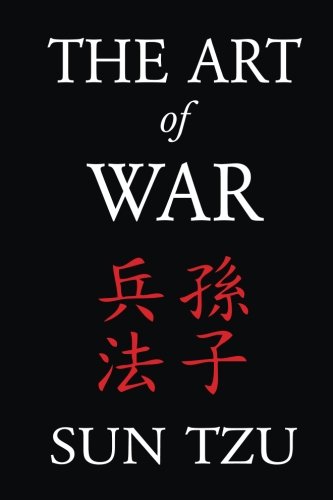
On my winter vacation, I read “The Art Of War” by Sun Tzu, as translated by Lionel Giles.
Summary
In the 5th century B.C., Sun Tzu, a General in the Chinese military, wrote a highly regarded treatise about combat strategy and tactics. While this has been used by armies around the world, it has also been adopted for use in various business cultures. In more modern times, the General’s philosophy toward fighting a war has proven to be a useful guidebook for traversing through the often treacherous world of corporate America. Regardless of whether you’re an enlisted person in the military or an office drone who daily faces cutthroat competition from co-workers, Sun Tzu has composed survival instructions.
The book consists of a total of 13 chapters as follows:
| 1. Laying Plans | 2. Waging War | 3. Attack By Stratagem |
| 4. Tactical Dispositions | 5. Energy | 6. Weak Points and Strong |
| 7. Maneuvering | 8. Variation In Tactics | 9. The Army On The March |
| 10. Terrain | 11. The Nine Situations | 12. The Attack By Fire |
| 13. The Use Of Spies |
Each chapter has sentences and paragraphs numbered for easy reference to the (usually short) pieces of information that the author has offered on a given topic. While each item may be considered individually, they can also be taken within the context of a given chapter as well.
Review
Is this book about The Art of War or is it about The Art of Survival? It could be argued that survival is in fact a war against the forces in life that want to destroy you in one fashion or another – so yes, perhaps the art of survival is, indeed, the art of war. From a philosophical context, one could make the argument that the art of war is both a war against society and a war against ourselves. So, in that manner, the art of war is, indeed, the art of survival – however, what one may be trying to survive from may be different depending on what your individual perspective is on almost any given day.
What exactly is it that motivates someone to read this book? Perhaps it is literally a militaristic context, but frequently, it is a necessity to keep one’s head above water in the business world. There is, however, another possibility: to understand the political climate in which we all find ourselves presently. To that end, “The Art Of War” may actually provide some insights – although that was probably not the original intent of its author from many centuries ago.
As far as the book itself it concerned, it would seem that it is directed to the most absolute of purists – that is because this version leaves no indication of its publisher nor of the scholar who provided the translation. The Spartan quality of the book would certainly explain the fact that it is without either an index, footnotes or annotations of any kind – too bad for the initial reader, but good for the more experienced reader familiar with this work. This version of the book is not recommended for someone who has never previously read, “The Art Of War”; instead, it is better for someone who has already consumed a translation (with interpretations), but wishes to experience a version without any editorialized comments.
|
|
No comments:
Post a Comment
Speak Your Piece, Beeyotch!